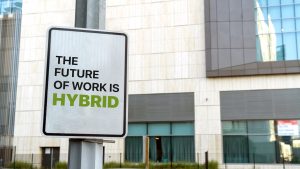As we move ever further into the world of hybrid working, some important questions are beginning to be asked about how this new behaviour (part-time in the office and part-time at home) is going to translate into a modern corporate environment, and more importantly, how will you be seen and heard, if your presence is largely absent from the hub of where the majority of your companies’ activities (the office) is taking place?
Hybrid Vs Remote working
You become known both to your immediate co-workers and cross-departmentally by being physically seen by them, but it’s not just about being seen, it’s far more than that. When you step into an office environment, you bring all three dimensions of yourself. It’s not just about how you write up a proposal or a report, but what you like watching on Netflix or how you like your coffee. We are, as a species, social animals, and these in-person interactions that happen in the corporate space help to drive forward our professional relationships; the personal can often be a gateway to driving forward a work-related project or other corporate-based outcomes.
These spontaneous interactions don’t often happen with remote, globally distributed teams, and periods of lengthy home-based solidarity can result in people feeling isolated and excluded from decision-making and from feeling like an important part of the corporate fabric.
This is truly a modern-day conundrum that has no easy answers.
Modern-day open plan offices can serve up just as many distractions and can erode people’s best laid productive intentions.
A timelyapp blog titled The Challenges of Hybrid Working points out: “New hybrid workers just starting their careers won’t be able to access the same training and mentorship their in-office counterparts would have enjoyed, and they won’t make the same connections. Good working relationships are enormously important when it comes to employee engagement and happiness, so this isn’t something that can be overlooked.”
Challenges of hybrid working
So, this points to an inequality that comes from the new generation of hybrid workers, who won’t benefit from the in-person experience and know-how that can be casually dispensed from people more senior in the company.
In addition, if you work in the same office as the CEO, COO or other senior C Level executives, this provides the opportunity to get to know them and give your thoughts and ideas about how best to develop the organisation. If you aren’t in the office, you aren’t just seen, but you aren’t heard either.
“You’re on Mute” are three words we have all become accustomed to hearing over the last few years, but could the hybrid worker be inadvertently muting themselves and risk becoming lost in a sea of names by not being physically present in the office?
To become a change maker, or become influential, presence is paramount, however, it is worth pointing out that hybrid working has many benefits.

Benefits of Hybrid working
Hybrid working gives employees the ability to address work-life balance and rebalance the scales in favour of life. Lengthy commutes can be disruptive and soul-destroying. The ability to skip the commute and have dedicated focus time free of office distractions, can’t be underestimated.
I think it’s a balancing act from giving employees the flexibility they would expect in the 21st century working world while also ensuring that you build a supportive environment that nurtures in-person conversation and socialising, while giving employees a high-performing collaboration meeting room solutions to interact with remote-based employees, to lessen the negative impacts of not being physically present.
This is a modern-day issue, with no easy answers, but having your voice heard and being seen will always continue to be important to spearheading your personal and professional development. Strong companies are built on the strength of their people, and as the employees needs and wants change.
In this new modern world, it will be up to the employers to ensure that they are adapting to meet these challenges.
Written by Stephen Carlisle,
August 2022




